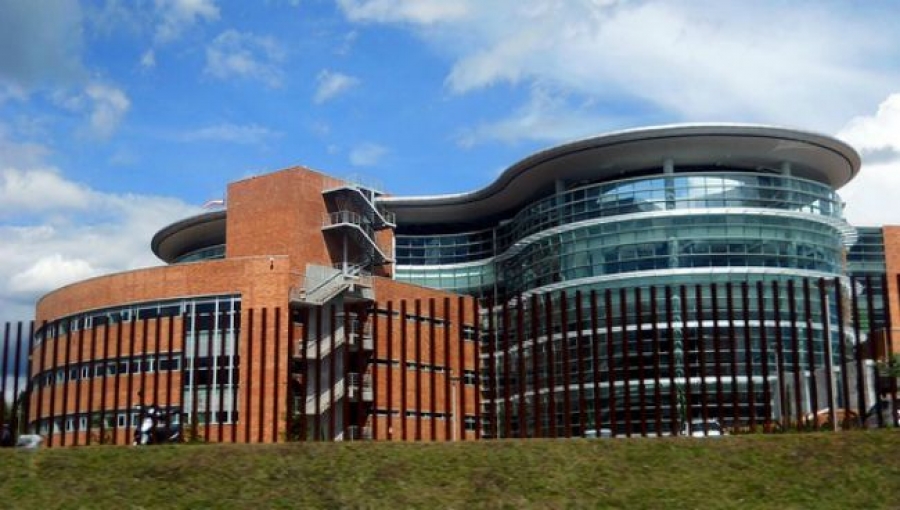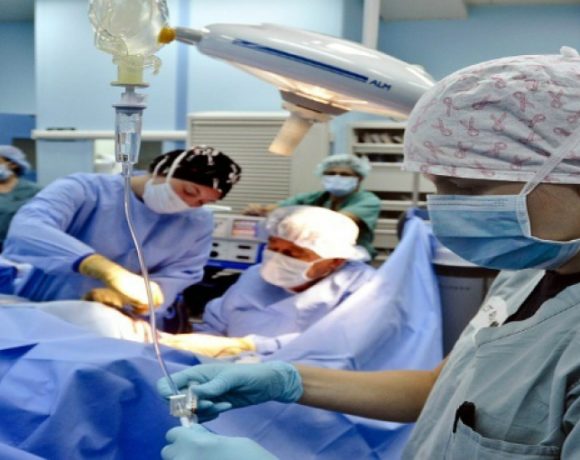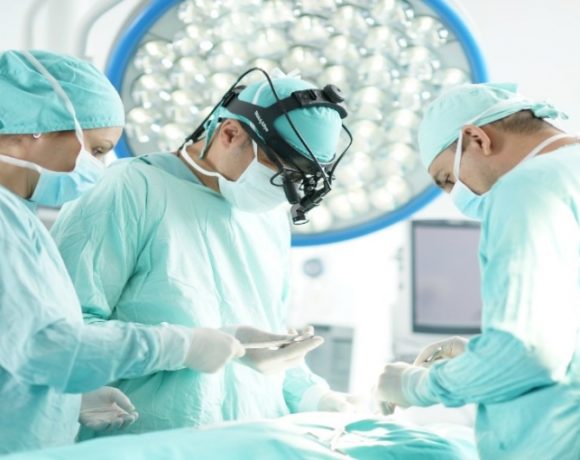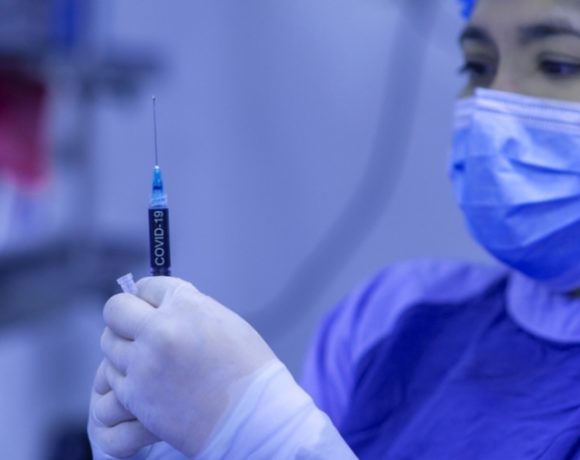Medicine in Medellin: Medical Tourism Growing (Part One)

Medical tourism is a growing business for metro Medellin thanks to a growing international reputation for high quality, high technology, friendly service, competitive prices – and assurance that patients can communicate with key personnel in English.
A logical starting point for English-speaking foreigners considering Medellin for such services is Salud Sin Fronteras (SSF), an organized network that includes metro Medellin’s most prestigious hospitals, clinics, doctors and multilingual service providers.
SSF’s member hospitals and clinics include Clinica CardioVID, Clinica Las Americas, Clinica de Oftalmologia Sandiego, Clinica Medellin, Clinica Las Vegas, Clinica El Rosario, San Vicente Fundacion and Hospital Pablo Tobon Uribe.
Five of those – Hospital Pablo Tobon Uribe, Hospital Universitario de San Vicente Fundacion (see photo, above), Clinica Las Americas, Clinica Medellin and Clinica Cardio VID – already are among the top-40-ranked hospitals in Latin America, as measured by an AmericaEconomia magazine survey in 2014.
SSF network members now offer cardiology and cardiovascular surgery, hemodynamics, pulmonology and thoracic surgery, orthopedics, bariatric (weight-loss) surgery, neurosurgery, oncology, urology, pediatrics, plastic surgery, “minimally invasive” general surgery, and ophthalmology. The SSF network members also offer executive checkups and eye checkups.
In an interview with Medellin Herald, SSF marketing coordinator Ana Maria Arboleda – a graduate of a Baltimore-based Towson University and capable in both English and Spanish – provided us with an overview of SSF’s history and service network.
Organ transplants aren’t allowed any more for foreign-tourist patients, as Colombian nationals by law now get first priority. This law put a halt to what had been a significant influx of medical tourists (most notably from Israel) that in years past had sought organ transplants, Arboleda said.
However, Colombia does allow foreigners to receive bone-marrow transplants, other types of special bone surgeries, and stem-cell transplants — all of which are recognized specialties performed by qualified Medellin doctors, and approved for both national and non-national patients, she said.
The SSF network boasts of well-trained medical professionals – some of whom have studied in the U.S. and Europe – as well as state-of-the-art medical technologies, she said.
Besides English-language services, SSF also arranges for services in other languages including French, German and even Papiamento (a language spoken in some Caribbean island nations), she said.
While some member hospitals and clinics are still in the process of obtaining JCI (Joint Commission International) certification, some SSF network members already have ISQUA (International Society for Quality in Healthcare) accreditation, in addition to “strict” Colombia national certification, she said.
SSF also is now part of Medellin’s “medical tourism” cluster, which recently signed agreements with the Medellin Convention & Visitors Bureau and the local Medical and Dental Cluster group.
The cluster — which arose in order to tie-together a network of numerous specialty clinics in Medellin — also is working to bring more medical-science conventions and congresses to Medellin, as well as promote institutional certifications.
Besides giving prospective patients customized advice about various health services available, SSF also offers assistance with travel arrangements including hotels, local ground transportation, interpreting services and tourist guides.
While SSF formally launched four years ago, the network actually traces its roots to the formation 16 years ago of a group of local hospital executives seeking to share experiences on medical tourism, Arboleda explained.
These discussions initially centered around the possibility of providing services to some of the millions of Colombians who in recent decades have moved overseas for work and study — what has become known as the “Colombian diaspora.” Discussions also included how Medellin hospitals and clinics might expand medical service offerings to other foreign visitors.
These discussions eventually led to the foundation of SSF, which now promotes medical tourism to Medellin partly via medical tourism fairs, foreign trade missions and by direct patient communications via phone, email and internet.
“We try to find answers and services for patients in a comprehensive way,” Arboleda said.
This can include obtaining required medical histories from the patient’s home doctor or clinic, arranging certain medical translations, organizing a patient’s trip agenda, and assisting families that may accompany a patient’s visit to Medellin.
While more foreigners are beginning to realize that high-quality medical care is now available in metro Medellin, people are often surprised at the relatively low costs, she said.
“Costs are very different” compared to medical services in the U.S. or Europe, Arboleda said. “You can pay US$100,000 for a service in the U.S., but here it can cost 40% less.”
An added bonus: the currently strong U.S. dollar versus the Colombian peso provides an extra incentive for the Medellin-bound medical tourist.
Word-of-mouth from satisfied patients is another factor that favors medical tourism to Medellin, she added. “We really care – we want them to have a good experience,” she said. This isn’t just because SSF network members want to deliver high-quality service to an initial patient, but also because the network members are anxious to generate positive referrals, she said.
Some individual members of the SSF network also are starting to publish data on patient satisfaction with services, for example the data posted to the Hospital Pablo Tobon Uribe web-site.
When prospective patients initially contact SSF, they’re asked about the type of treatment sought, and what medical records are available that can aid diagnosis and treatment.
“It doesn’t matter if the [required medical] specialist isn’t at one specific SSF clinic,” Arboleda said. Rather, the appropriate specialist can be obtained at another clinic. “We’ll find the right specialist for that patient’s situation,” as well as provide “approximate cost” quotes for the treatment, she added.
If requested, SSF also can arrange a direct conversation between the prospective patient and the doctor.
“Of course it’s kind of scary” for foreign-based patients that don’t know what to expect from a trip to Medellin for a medical procedure, she said. Such patients want to know about the consequences of foreign medical treatments, the potential risks, the advantages, and the costs.
“It’s delicate,” she said. “You need to provide reliable information” as well as assurances about the quality of care.
Such assurances are part of the standard system of medical diagnosis at the SSF network hospitals, as teams of doctors examine individual cases that may present special difficulties, such as patients with resistance to certain types of drugs. If any specialist on the review team disagrees with a proposed avenue of treatment, then subsequent reviews are undertaken until a consensus is reached, she explained. “It’s a very conscientious process,” she added.
As for emergency services for foreigners visiting Medellin, local hospitals usually have an internal system for handling communications with patients that don’t speak Spanish, she said. When these hospitals or clinics need extra help on more-complicated patient issues, then they may call SSF, she said.
As for patient payment for services rendered, “most hospitals have different experiences with various insurance companies to handle claims and invoices. But the patient might not have all the coverages [for certain procedures], so the patient may have to pay in cash,” and then get reimbursement from the insurance company afterward, she added.
SSF patients are pre-qualified for ability-to-pay for medical services – with SSF helping them obtain cost estimates for services in advance.
However, Medellin hospitals unfortunately have seen a recent surge in “backpacker” patients – that is, low-budget tourists that suffer accidents in Medellin, then show-up at emergency rooms with no insurance — and no proof of ability to pay.
Some of these backpacker-patients have relied on their parents to cover medical bills, Arboleda said. But some of these tourists haven’t even bothered to tell their parents that they were traveling to Medellin.
In some cases, this has resulted in parents flying to Medellin to handle the emergency situation – and then discovering “how beautiful are our facilities,” she added.
Next/Part Two/Dissecting Colombia’s Health-Care Financing Issues
















